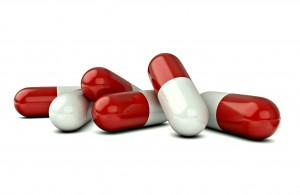Antibiotic resistant bacteria are becoming more common and that worries scientists and doctors. The latest outbreak of Salmonella in Foster Farms chickens has hospitalized 40% of patients, largely because the Salmonella bacteria is antibiotic resistant.
 A recently published study, conducted by scientists in Tel Aviv, has found a protein that could kill antibiotic resistant bacteria. The protein is in a bacteriophage, which is a virus that infect bacteria. Phages do not affect people. The T7 phage is deadly to E. coli.
A recently published study, conducted by scientists in Tel Aviv, has found a protein that could kill antibiotic resistant bacteria. The protein is in a bacteriophage, which is a virus that infect bacteria. Phages do not affect people. The T7 phage is deadly to E. coli.
T7 has 56 proteins. One of the T7 proteins, called gene product 0.4, (GP0.4) stops E. coli cell division. The bacteria become “morphologically elongated” and die exposed to the protein.
Dr. Udi Qimron, one of the authors of the study, said in a statement, “Ever since the discovery of bacteriophages in the early 20th century, scientists have understood that, on the principle of the ‘enemy of my enemy is my friend,’ medical use could be made of phages to fight viruses. Potentially, this protein could be the ideal antibiotic.”
But one of the problems with using bacteriophages is getting them into the body. The spleen and liver filter them out in human beings, and your antibodies destroy them. Companies are looking at ways to deliver the protein in the form of a drug.





If doctors would stop prescribing so many antibiotics then we wouldn’t have this problem. They prescribe antibiotics for every little thing these days. We need an antibiotics awareness day like they have in Europe. If this were the case then at least people would be informed and could make their own decisions about taking them instead of always listening to their doctor.
Unfortunately, antibiotic use on factory farms is a bigger problem. Of course doctors should use antibiotics judiciously and only when needed. But 80% of the antibiotics sold in this country are used to improve growth and prevent disease in farm animals. And when they’re used at a sub therapeutic level (that’s like everyone not finishing a course of antibiotics), bacteria easily evolve to become resistant to the drugs.